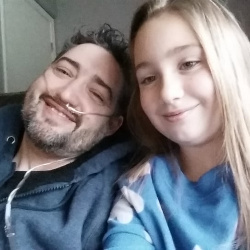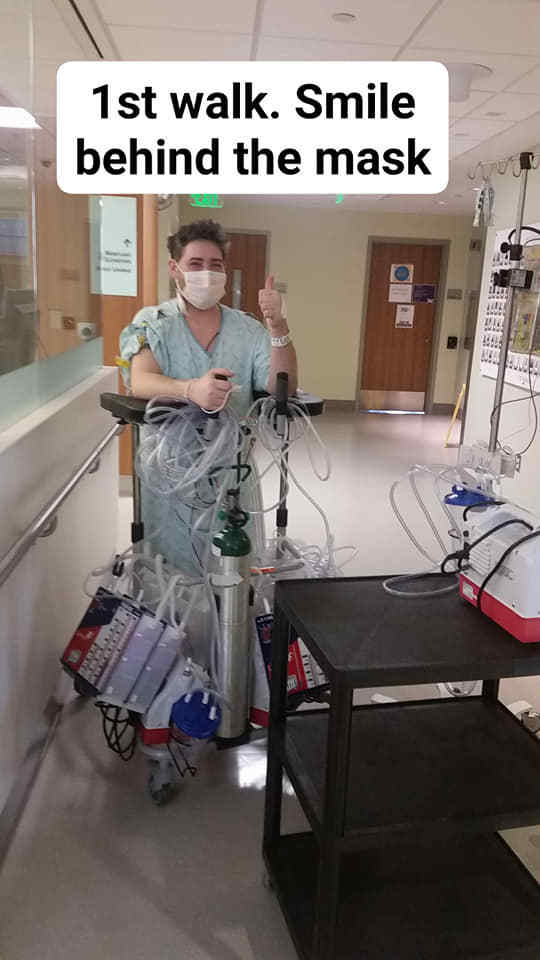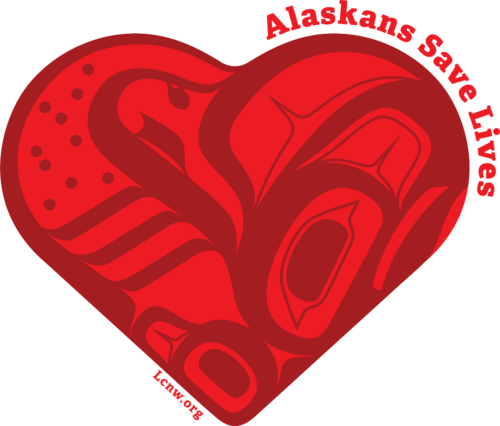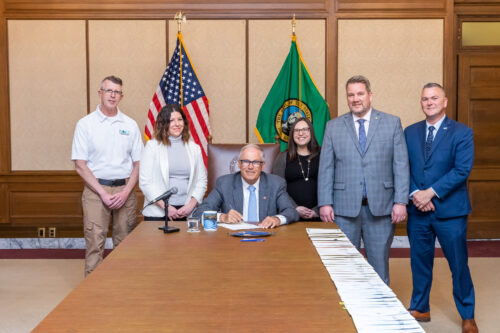**This is a guest blog submitted by Joshua Hunter. This piece details Joshua’s transplant journey and recovery.
I’m a double lung transplant recipient. My wife and I believe that without the generosity of an organ donor, I wouldn’t be here to tell my story.
My story begins with a diagnosis fifteen years ago – I was at a low ebb in my life. I was young, emotionally shattered by a broken relationship, and not at all prepared for the ramifications of the diagnosis I was about to receive.
My original diagnosis was sarcoidosis with granulomas. It’s a rare disease that is similar to COPD in its symptoms: significant coughing, shortness of breath, and multiple lung collapses upon exertion. This disease can attack several different organs, even skin and eyes. It settled in my lungs, interstitially – meaning it spread throughout the entire lungs.
I went into remission for the next ten years. In 2019, the wheels fell off – sending my life into a complete spin. I lost my identity, physical capacity, and independence. My choices? I could choose to be depressed at the terminal nature of my diagnosis or I could accept my circumstances and fight for every day of life. With the help of the amazing University of Washington Specialties Clinic, I chose to fight. It was hard work.
I had been employed in a fast-paced, customer service industry taking care of people and working with a crew. They were like family to me after 17 years. I intended to retire with the company, continuing to grow my abilities and career in order to provide for my family. Losing my job was an excruciating price to pay. My soul hurt.
I felt I wasn’t providing for my family anymore, not doing what I ought to do. The guilt I felt over my wife picking up the slack for me left me feeling like I had failed. In retrospect, I put too much emphasis on my job. My identity was too wrapped in what I did, rather than who I was becoming. By the time I finally figured out a better way to manage how I derived my identity, my physical limitations began to interfere with the practicalities of life.
My oxygen flow had increased to a rate of 3 liters. At times, I could sit with the family to watch a movie and not need it. But that quickly became the exception. My lung capacity started to fail. Where once I led and managed people, hustling from one problem-solving situation to another, now, I couldn’t even finish a 6-minute walk test. Where once I enjoyed playing intense basketball, I could no longer walk the distance of our driveway. I could barely hold meaningful conversations without coughing or needing to catch my breath to finish the sentence. I’veenjoyed singing my entire life. With my oxygen failing, singing was difficult if not impossible.
My oxygen supplement needs rose significantly, requiring 3 times the oxygen simply to talk. This destroyed my quality of life and any sense of independence I might have had. I could not drive. I had a limited oxygen supply and needed it continuously. What if there was a car accident? What if there was an unexpected traffic delay? What if we were in an area without a medical facility? What if I blacked out and crashed? Were our kids safe to be with me if I was driving? The answer was unequivocally, NO.

Oxygen supplementation created the constant need for logistical planning – just to go to the store or go get coffee. I could not vacuum or mop our floors because of the dust; the pushing and pulling might cause a strain and another lung collapse. We didn’t know how much longer it would take for a donor match to be found. Our lives were at a standstill. I slept in a separate room from my wife where the medical bed could be situated, which further eroded my sense of well-being. It was an ordeal to shower and dress. I tried to keep my legs and core muscles engaged, because I knew that whatever muscles I had left, I would need them for post-transplant recovery.
Two weeks before surgery, I could only do 10 minutes on the elliptical, using the highest flow of oxygen. “I don’t know how much longer I can do this,” I told my wife. Not that I was giving up, but I recognized how quickly I was deteriorating.
March 19, 2022, I finally received “the call.” This meant there was a tissue match with lungs the right size for my body. I stayed overnight at the University of Washington. I don’t remember much about the next day, other than the UW team of nurses, coordinators and surgeons were completely vested in the possibility of my transplant. It was humbling to receive so much support and well-wishes from absolute strangers, most of whom I might never see again as I underwent the surgery.
The UW team’s dedication is something I will never forget. It gave me hope! The next day I was cognizant of what had just happened. It was so surreal. I asked the ICU nurse if the surgery had actually taken place. She told me I had new lungs! I was filled with gratitude.
On reflection, a resilient mind has been my biggest ally – forged by four years of learning to cope with increased limitations. A half-decade felt like an eternity. These challenges have transformed me into a stronger man. My faith has grown. Despite all the obstacles, I have a renewed sense of self-awareness.
I wrestled mentally, in prayer, asking for a set of lungs to emerge knowing it would be at the expense of someone else’s life. Was it right to want this? My counselor said, “You’re not praying for someone to die.” He and other experienced medical practitioners told me that for many donors, their last wish is to see another person’s life extended. This eased my concerns.
Recovery post-transplant hasn’t been easy. About once a month, I’ve hit some sort of a snag. A scary rejection episode occurred and I needed an eight-day hospital stay with a total of five infusions to stabilize. That said, I can look at the big picture and say, how amazing this is. What I couldn’t do six months ago, compared to what I can do now, is astounding.

I began exercising on the elliptical once again, starting at 20 minutes without supplemental oxygen for the first time since 2019. Monitoring my progress through the first week of exercise sessions, I stayed in rhythm with the pace. No issues developed as I began exercising again in moderation. A full week of 20-minute sessions led to 40-minutes, then 60-minutes. I completed my first sets of push-ups and sit-ups with my doctor’s release of all physical limitations post surgery!
I have the ability to walk and talk simultaneously – something I will never take for granted! There’s a waterfront walk in Tacoma where the air is clean and fresh; it is beautiful. I walked it frequently with my father-in-law. We talked about life. I told him if I could do anything, it would be to help other people. We discussed creative ideas of how I might begin that process. We talked about family plans. Plans that had been scrubbed from itineraries for years without the hope of rekindling, Now, adventures await my family and I because of the new found freedom granted by a double lung transplant. I want to thank my anonymous donor and their family who so generously gave me a new beginning. Without this incredible gift, I might not be alive today!
I am so grateful to Life Center NW for procuring the lungs, and the UW transplant team doctors, surgeons, nurses, coordinators and providers who went to amazing lengths to make this happen. Thanks to my beautiful family, caregivers, and all the people who generously donated to our care fund. Thank you, God, for allowing me to get a second wind of breath! Without my faith I wouldn’t have had the strength to see this through. My anonymous donors’ lungs came from outside our region. The level of organization and teamwork to make that happen is extraordinary! There are so many layers to the process of an organ transplant. It’s mind-boggling to think about how complex the process truly is – the layers of coordination, experience, know-how, and savvy.
I stand before you…BREATHING. Looking ahead at new possibilities – none of which were possible before my transplant. To express gratitude, I would like to help others through both sides of the transplant donation process. I love my new life! I hope to inspire you to make the most of your life – each and every day –and encourage you to make the life-saving gift of organ donation.
You can register your decision to become an organ, eye or tissue donor here on our website.




